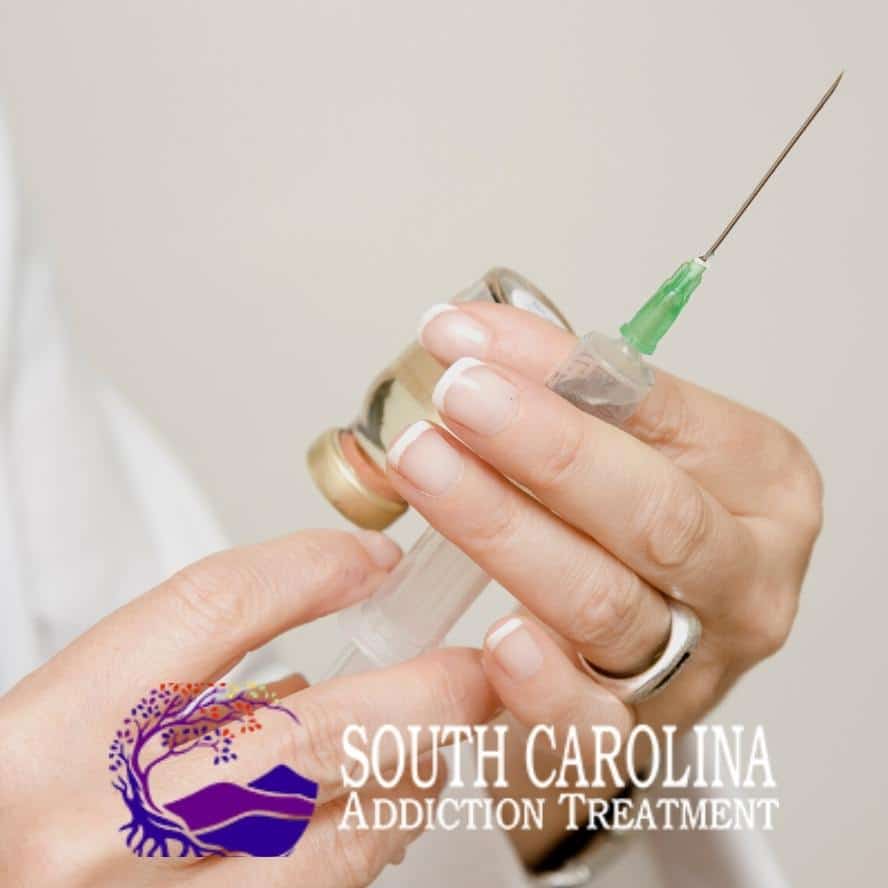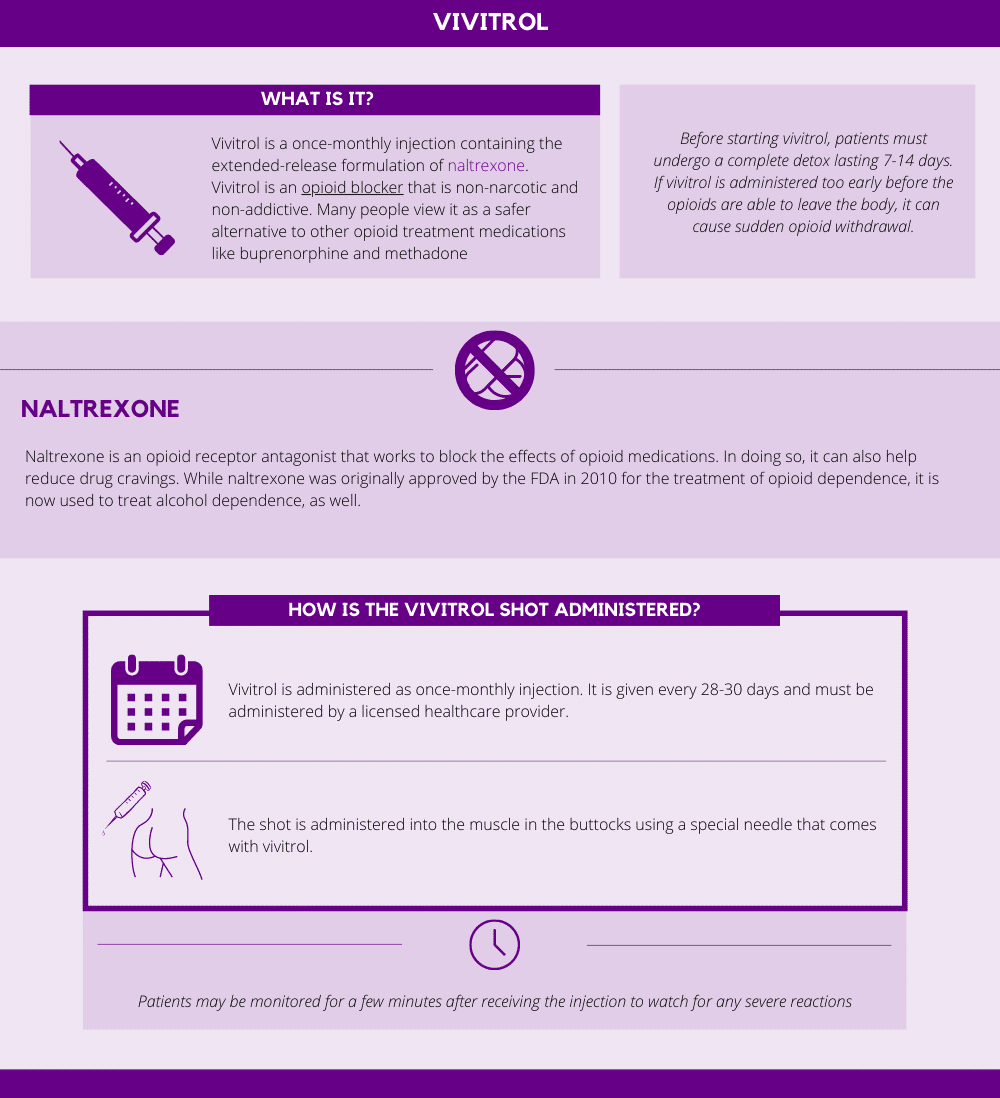Vivitrol Treatment in South Carolina

Medically Verified: 2/1/24
Medical Reviewer
Chief Editor

All of the information on this page has been reviewed and verified by a certified addiction professional.
Individuals struggling with opioid addiction benefit from Medication Assisted Treatment with Vivitrol. Medication-Assisted Treatment (MAT) programs use prescription drugs to aid in the recovery from opioid addiction.
Vivitrol is utilized during inpatient and outpatient treatment in South Carolina to reduce drug cravings and the overall risk of relapse. Vivitrol differs from other prescriptions used during MAT as it is a once-monthly injection with no potential for abuse. However, it is a newer medication, so many people are worried as to whether or not it is safe to use.
Here is what patients can expect from treatment with Vivitrol in South Carolina.
What is Vivitrol?
Vivitrol is a brand-name, extended-release medication containing naltrexone. It is used during MAT programs after a person successfully completes detox from opioids or alcohol. Vivitrol is an opioid blocker, meaning that if a person takes an opioid while on this medication, they will not feel the effects of the drug.
In addition to blocking the pleasurable effects that a person gets when taking opioids, it also reduces the cravings recovering users have for those substances. This means that people don’t have strong urges to use drugs such as heroin, oxycodone, and alcohol. By reducing the cravings for these drugs, the risk of relapse is reduced.[1]

Vivitrol for the Treatment of Alcoholism
Vivitrol is a powerful tool for opioid addiction, but it is also shown to be an effective treatment for alcoholism as well. Although it is unknown exactly how naltrexone works to treat alcoholism, it is shown to reduce cravings for alcohol and reduce relapse rates among people recovering from alcohol addiction.[2]
Benefits of Taking Vivitrol
Vivitrol is a once-monthly injection, meaning patients do not need to remember to take a pill every day. This makes compliance rates much higher among individuals using Vivitrol in their MAT programs when compared with others who are on Suboxone or Subutex.
Vivitrol does not contain any narcotics or opioid medications. This means it is not habit-forming or addictive. It also does not cause withdrawal symptoms if a dose is missed or if individuals stop taking the drug.
Side Effects of Vivitrol
Like any medications, Vivitrol also has some side effects. The most commons side effects include:[2]

- Mild redness or discomfort at the injection site
- Decreased appetite
- Nausea or vomiting
- Muscle or joint pain
- Dizziness
- Insomnia
- Cold-like symptoms such as a runny nose or sneezing
These symptoms tend to be mild and typically resolve within a few days after the initial injection, however, there are side effects that are signs of severe adverse reactions. Severe side effects that require immediate medical attention are:
- Difficulty breathing
- Severe pain or skin issues at the injection site
- Signs of liver damage including jaundice, right upper abdominal pain, dark urine, or fatigue
- Unusual mood changes
Patients in Vivitrol treatment in South Carolina have regular check-ups with their physician to discuss any side effects.
How to Take Vivitrol
Vivitrol is injected intramuscularly into the thigh or buttocks once a month by a licensed healthcare professional. It is important to be fully detoxed from opioids prior to taking Vivitrol. Taking Vivitrol is an opioid blocker, meaning people can be put into sudden opioid withdrawal if they take Vivitrol while they are still on opioids.
It is also important to not attempt to overcome the effects of Vivitrol by taking more opioid drugs. Doing this results in drug overdose and sometimes death. Vivitrol is most effective when used in conjunction with therapy for drug and alcohol addiction.
Detox
Vivitrol treatment starts with detox. Inpatient detox lasts from one to two weeks after a person last takes a drug. During this time, the opiates and/or alcohol are cleared out of the body. People experience withdrawal during drug and alcohol detox that may be treated with other medications.
Medical professionals monitor people throughout the detox process to ensure they remain safe and avoid any complications from drug or alcohol withdrawal. They can also administer medications to reduce the side effects of withdrawal.
Treatment with Vivitrol After Detox
Treatment options after detox include inpatient as well as outpatient rehabilitation programs. Generally, people will complete a 30-day inpatient treatment that provides physical separation from drugs as well as intensive group, family, and one-on-one therapy.
After completing inpatient rehab, people usually continue with treatment as an outpatient to transition into normal day-to-day life. During outpatient treatment, people still participate in different forms of therapy but also return to some of their normal routines such as working. Treatment with Vivitrol can be started at any point of the treatment process, whether that be inpatient or outpatient.
Therapy allows people to address the root causes of their addiction while Vivitrol aids in reducing the physical symptoms that occur during early recovery. Therapy and Vivitrol work together as a full treatment for opioid and alcohol addiction to prevent any future relapses.
Start Treatment With Vivitrol in South Carolina Today
South Carolina Addiction Treatment is here to help individuals throughout the entire recovery process including detox, inpatient, and outpatient treatment. Our highly trained staff works closely with each patient to determine a treatment plan that best suits their needs. Our goal is to provide patients with all of the tools they need to have a long-lasting recovery from drug and alcohol addiction. Contact us today to learn more about addiction treatment with Vivitrol in South Carolina today.
References:

